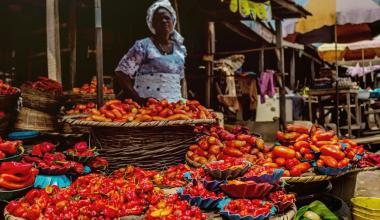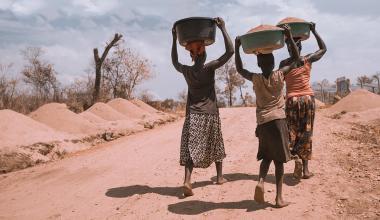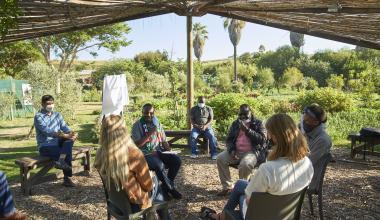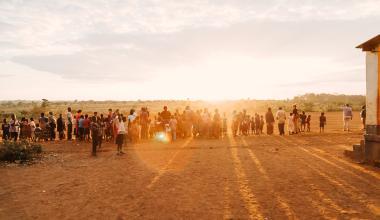More than half of all people living on the African continent base their livelihood on agriculture. Despite this, as much as a fifth of its population is malnourished — far more than other regions around the world.
Organic agriculture based on the four principles of health, ecology, fairness and care and including agroecology has shown to be a strong pathway for ensuring food and nutrition security. For smallholder farmers, it’s a system that is equal or better than most conventional systems, as well as being more likely to be sustainable in the long term. A transition to organic production systems also has lasting positive effects, since it contributes to maintaining natural, social, human, financial, and physical capital in farming systems.
Across all spheres, it is strategically relevant to promote food systems that strengthen food and nutrition security while respecting planetary boundaries. Ecological Organic Agriculture (EOA) has a significant role to play in achieving this. Currently, 24% of the world’s organic producers are based in Africa, with more than two million hectares of certified organic agriculture (2% of total agricultural land worldwide), which is mostly destined for the international export market. The recent global pandemic has reiterated the importance of food and nutrition security and indicated that Africa will look to develop stronger internal markets.
There are different challenges in instigating transformational change in food systems, including the need for strong Rural Service Providers (RSPs) - hereon called multipliers. These are key at the community level in order to foster agroecological solutions. These multipliers include (but are not limited to) lead farmers, technicians, extensionists, advisors linked to grassroot organisations, NGOs, communication officers, and private or public organisations. Multipliers with strengthened capacities — as well as the necessary tools, skills and attitude — can lead, guide and support processes that will deliver an endogenous development, a robust economy, and an overall well-being and prosperity for their communities.
The global project “Knowledge Centre for Organic Agriculture” (KCOA), implemented by The Deutsche Gesellschaft für Internationale Zusammenarbeit (GIZ) and funded by the Federal Ministry for Economic Cooperation and Development (BMZ), works towards closing these existing gaps.
Background
This Project builds on the successes and results of the Training of Teams of Trainers (ToToT), under Phase I of the Project, in the framework of the KCOA Project.
In the previous Phase of the Project, IFOAM-Organics International delivered ToToTs to a total of 102 participants trained across nine countries with the involvement of 20 co-trainers/resource persons from Africa and seven national partner organisations.
Against the above-mentioned backdrop, the activities put forth in this Project aim to reinforce and further propagate the success of previously held ToToTs through quality assurance mechanisms. These mechanisms include coaching, networking, strengthening of policy and advocacy, multiplier trainings, and refresher trainings for the ToToT and EOALC participants in the 5 African Regional Hubs (Southern, Central and West Africa and also in North and East Africa).
Objective
The main objective of this Project is to contribute to the ability of actors in the Ecological Organic Agricultural (EOA) sector to assume leadership as trainers as well as support and promote the development of truly sustainable agroecological organic agriculture and sustainable food systems, focusing on capacities for advocacy, policy dialogue, and networking for strong influence.
The objective is interlinked to the Sustainable Development Goals (SDGs), with particular reference to goals 2, 3, 12, 13 and 15 in regard to agroecological and organic agriculture practices, and goals 1, 5 and 8 in terms of socio-environmental and economic development.
The impact hypothesis of this project is the establishment of a well-coordinated, multi-level, and multi-stakeholder trainer platform with empowered agents of change in terms of knowledge, attitude and skills;
- to train multipliers through a cascade system, and;
- to institutionalise the knowledge gained into their supporting institutions to foster and instigate more enabling conditions for agroecological transition.
It is expected that the trainings and coaching generate awareness which then results in on-the-ground action, both of which are crucial elements in changing African agriculture and food systems towards true sustainability. It is of utmost importance to upskill and capacitate current and emerging future change agents to lead and manage such transition, and most of all use their skills to speed up current uptake. Developing skilled trainers creates a strong platform for growing and accelerating change at multi-level policy networks.
Contacts:
Patricia Flores - Senior Global Academy Manager (p.flores@ifoam.bio)
Flavia De Marchis - Project Coordinator (f.demarchis@ifoam.bio)

Training of Teams of Trainers (ToToT) in Cameroon
Read more
Training of Teams of Facilitators, the ToToF in East Africa
Read more
How Organic Leadership is Transforming Agriculture in Namibia!
Read more
Training of Teams of Trainers (ToToT) in Zambia and Zimbabwe
Read more
Training of Teams of Trainers (ToToT) in South Africa
Read more
Training of Teams of Trainers (ToToT) in Benin
Read more
Training of Teams of Trainers (ToToT) in Nigeria
Read more

